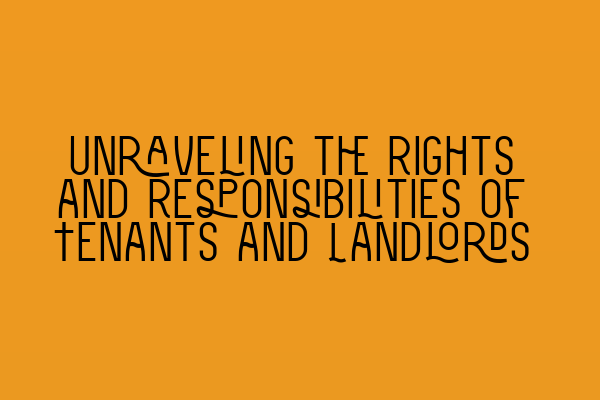Unraveling the Rights and Responsibilities of Tenants and Landlords
As solicitors specializing in property law and land law, we understand how important it is to have a clear understanding of the rights and responsibilities of both tenants and landlords. Whether you are a tenant looking for a new place to call home or a landlord looking to rent out your property, it is crucial to know your legal rights and obligations to ensure a harmonious and legally compliant tenancy agreement.
In this blog post, we aim to shed light on the key rights and responsibilities that tenants and landlords should be aware of. We will also provide expert insights on common issues that arise in tenancy agreements, such as repairs and maintenance, rent increases, eviction processes, and more.
1. Tenants’ Rights and Responsibilities
Tenants have certain fundamental rights that protect them from unfair treatment and ensure their safety and security. These rights include:
a. Right to Live in a Safe and Habitable Property: Landlords have a legal obligation to provide tenants with a property that meets health and safety standards. This means ensuring that the property is structurally sound, has proper sanitation facilities, and is free from hazards.
b. Right to Quiet Enjoyment: Tenants have the right to enjoy their rented property without interference from the landlord, as long as they comply with the terms of the tenancy agreement. Landlords should not disturb their tenants without a valid reason and should provide notice before entering the property.
c. Right to Privacy: Tenants have the right to privacy in their rented property. Landlords should not invade their privacy by, for example, constantly entering the property without notice or installing surveillance cameras without consent.
d. Responsibilities: Tenants have responsibilities as well. These include paying rent on time, reporting any repairs or maintenance issues promptly, and complying with the terms of the tenancy agreement.
For a comprehensive overview of tenants’ rights, you can refer to this article on our website: [Tenant’s Rights and Legal Obligations](https://fqps.co.uk/sqe/sqe1-preparation/mcq-practice-quiz)
2. Landlords’ Rights and Responsibilities
Landlords also have rights that protect their property and ensure a smooth rental experience. These rights include:
a. Right to Receive Rent: Landlords have the right to receive the agreed-upon rent on time. Tenants should fulfill their financial obligations by paying rent promptly and in full.
b. Right to Establish Terms and Conditions: Landlords have the right to set the terms and conditions of the tenancy agreement. This may include rules about pets, smoking, and permitted use of the property.
c. Right to Inspect the Property: Landlords have the right to inspect the property, but they must provide reasonable notice to the tenant and ensure the inspection is not overly intrusive.
d. Responsibilities: Landlords also have responsibilities, including maintaining the property in a safe and habitable condition, making necessary repairs within a reasonable timeframe, and providing tenants with necessary information, such as their contact details and the tenancy agreement.
For more detailed information on landlords’ rights and responsibilities, you can read this article on our website: [Landlord’s Guide: Rights and Obligations](https://fqps.co.uk/sqe/sqe1-preparation/practice-mocks-quiz)
3. Common Issues and Disputes
Despite the best efforts of both tenants and landlords, disputes can arise in the landlord-tenant relationship. It is essential to address these issues promptly and fairly. Some common issues include:
a. Repairs and Maintenance: It is the landlord’s responsibility to ensure that the property is in good repair. Tenants should promptly report any maintenance or repair issues to the landlord so that they can be addressed.
b. Rent Increases: Landlords have the right to increase the rent, but there are legal requirements and procedures that must be followed. Tenants should be aware of their rights and seek legal advice if they believe a rent increase is unfair or excessive.
c. Eviction: There are specific legal procedures that landlords must follow if they wish to evict a tenant. Tenants have the right to challenge an eviction in certain circumstances, such as if they believe it is retaliatory or discriminatory.
d. Deposit Disputes: Disputes often arise regarding the return of the security deposit at the end of the tenancy. Both tenants and landlords should familiarize themselves with the legal requirements for handling and returning deposits.
To learn more about how to handle these common issues and disputes, refer to this comprehensive guide on our website: [Resolving Landlord-Tenant Disputes](https://fqps.co.uk/sqe/sqe2-preparation)
In conclusion, understanding the rights and responsibilities of tenants and landlords is crucial for a successful and harmonious landlord-tenant relationship. By familiarizing yourself with these rights and responsibilities, you can ensure that you are acting within the bounds of the law and protect your interests. If you require legal advice or assistance in navigating these matters, our team at SQE Property Law & Land Law is here to help. Contact us today for expert guidance on your property-related issues.
To find out more about our services and how we can help you, explore our website and check out our SQE preparation courses: [SQE 1 Preparation Courses](https://fqps.co.uk/sqe/sqe1-preparation) and [SQE 2 Preparation Courses](https://fqps.co.uk/sqe/sqe2-preparation). You can also find important information about SRA SQE exam dates here: [SRA SQE Exam Dates](https://fqps.co.uk/sqe/sqe1-sqe2-exam-dates).
Remember, knowledge is power, and being well-informed about your rights and responsibilities will ensure a smoother and more secure rental experience for both tenants and landlords.
